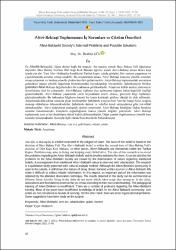Alevi-Bektaşi toplumunun iç sorunları ve çözüm önerileri
Künye
Gül, İ. (2021). Alevi-Bektaşi toplumunun iç sorunları ve çözüm önerileri. Afyon Kocatepe Üniversitesi Sosyal Bilimler Dergisi, 23(1), 37-50. Doi: 10.32709/akusosbil.559514Özet
Alevilik-Bektaşilik, İslam dinine bağlı bir inançtır. Bu inancın temeli Hacı Bektaş Veli öğretisinedayalıdır. Hacı Bektaş Veli'nin Dört Kapı Kırk Makam öğretisi içinde Alevi-Bektaşi inancı ikinci kapıiçinde yer alır. Yani Alevi-Bektaşiler kendilerini Tarikat kapısı içinde görürler. Her inancın yaşanması veyaşatılmasında sorunlar ortaya çıkabilir. Bu araştırmanın amacı, Alevi-Bektaşi inancına yönelik sorunlarıortaya çıkarmak ve bunlara yönelik çözüm önerileri geliştirmektir. Alevi-Bektaşi toplumundaki sorunlarıngeleneksel inanca yönelik değerlerin bozulmasından kaynaklandığı söylenebilir. Şehirleşmeyle birliktegeleneksel Alevi-Bektaşi değerlerinden bir uzaklaşma görülmektedir. Araştırma kültür analizi yöntemiyledesenlenmiş nitel bir çalışmadır. Alevi-Bektaşi toplumu dışa açılmasına rağmen halen kapalılık özelliğigöstermektedir. Alevi-Bektaşi yaşamında yazılı kaynakların sınırlı olması, güvenilir bilgi toplamayıgüçleştirmektedir. Bu bakımdan bilgilerin önemli bir kısmı katılmalı gözlem tekniği ile elde edilmiştir.Araştırmada elde edilen sonuçlar şöyle özetlenebilir: Şehirlerde yaşayan bazı Aleviler hangi Alevi ocağınamensup olduklarını bilmemektedirler. Şehirlerde dernek ve vakıflar kendi anlayışlarına göre yol-erkansürmektedirler. Alevi dedelerinin pedagojik eğitimi yetersizdir. Alevi-Bektaşi kimliğine ilişkin birtakımsorunlar bulunmaktadır. Gençlerin çoğunluğunun inanca yönelik bilgileri yetersizdir. Alevi Bektaşitoplumunda cem evleri ibadethane olarak kabul edilmemektedir. Diğer yandan örgütlenmeye yönelik bazısorunlar bulunmaktadır. Konuyla ilgili olarak bazı önerilerde bulunulmuştur. Alevilik ve Bektaşilik is a belief connected to the religion of Islam. The basis of this belief is based on the doctrine of Hacı Bektaş Veli. The Alevi-Bektashi belief is within the second door of Hacı Bektaş Veli's doctrine of Dört Kapı Kırk Makam. In other words, Alevi-Bektashis see themselves inside the Tarikat Kapısı. Problems may arise in living and keeping every belief alive. The aim of this research is to reveal the problems regarding the Alevi-Bektashi beliefs and to develop solutions for them. It can be said that the problems in the Alevi-Bektashi society are caused by the deterioration of values regarding traditional beliefs. A estrangement from traditional Alevi-Bektashi values is observed with urbanization. The research is a qualitative study patterned with cultural analysis method. Although the Alevi-Bektashi community is open to the outside, it still shows the feature of being closed. Limited written sources in Alevi-Bektashi life make it difficult to collect reliable information. In this respect, an important part of the information was obtained by the attended observation technique. The results obtained in the study can be summarized as follows: Some Aleviler living in the cities do not know which Alevi ocağı they belong to. In the cities, associations and foundations continue the yol-erkan according to their own understanding. The pedagogical training of Alevi Dedeleri is insufficient. There are a number of problems regarding the Alevi-Bektashi identity. Most of the youth have insufficient knowledge of belief. In the Alevi Bektashi community, cem evleri are not considered as houses of worship. On the other hand, there are some organizational problems. Some suggestions have been made on the subject.
















